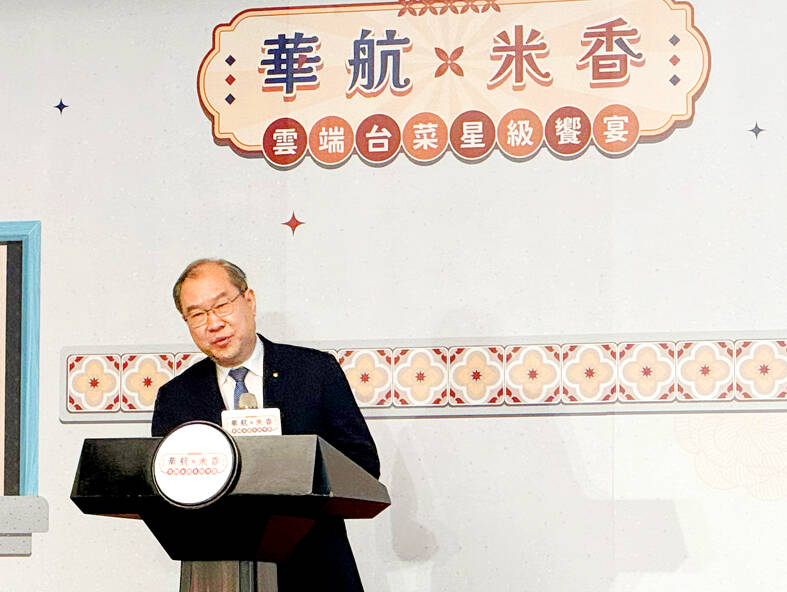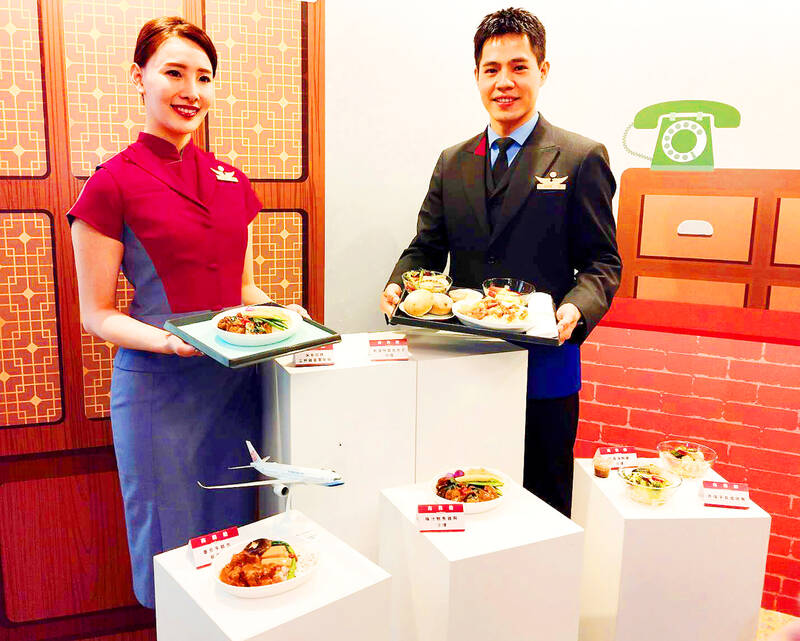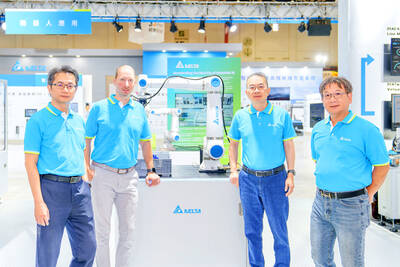China Airlines Ltd (中華航空) yesterday said that it is optimistic about this year’s business outlook, and expects to receive five Airbus SE 321neo passenger aircraft and three Boeing Co 777F cargo jets as the airline continues to renew its fleet and enhance its overall performance.
The airline plans to retire its fleet of Boeing 737-800 passenger planes in phases to maintain stability in its regional flight schedule, China Airlines president Kao Shing-hwang (高星潢) said on the sidelines of a news conference in Taipei, at which the airline introduced new in-flight meals designed by chefs at Grand Mayfull Hotel Taipei (台北美福大飯店).
China Airlines is to continue its fleet renewal as the airline positions itself for future growth, with plans to lease at least one Airbus 350-900 passenger plane this year and introduce 24 Boeing 787 passenger planes from next year to 2028 to improve its operating efficiency on long-haul routes, it said at an earnings conference in November last year.

Photo: CNA
The airline is also looking to accelerate the retirement of its Boeing 747-400F cargo jets this year to reduce fuel costs, it added.
Kao said the airline is still in the process of developing new routes. Earlier this month, the airline announced that it would begin a nonstop service between Taiwan Taoyuan International Airport and Seattle on July 14 after a 16-year hiatus.
China Airlines joins US carrier Delta Air Lines Inc and fellow Taiwanese carriers EVA Airways Corp (長榮航) and Starlux Airlines Co (星宇航空) in adding a nonstop service to Seattle this year as airlines expand their North American network of destinations to take advantage of growing demand for travel between Taiwan and the US.

Photo: CNA
While the direct flights to Seattle offered by rival carriers would increase competition, China Airlines does not expect a significant impact on its ticket prices given robust demand, Kao said.
China Airlines last year posted revenue of NT$184.82 billion (US$5.78 billion), a 22.6 percent year-on-year increase, driven by a 354.14 percent surge in passenger revenue of NT$115.72 billion, despite a setback in cargo revenue compared with a year earlier.
The airline’s net profit surged 138.47 percent year-on-year to NT$6.82 billion last year, while earnings per share rose to NT$1.13 from NT$0.48, company data showed.
China Airlines’ new in-flight meals are available on Taiwan-China and Taiwan-Southeast Asia routes, as well as some flights to Japan and South Korea, starting on Monday next week, the airline said.

SETBACK: Apple’s India iPhone push has been disrupted after Foxconn recalled hundreds of Chinese engineers, amid Beijing’s attempts to curb tech transfers Apple Inc assembly partner Hon Hai Precision Industry Co (鴻海精密), also known internationally as Foxconn Technology Group (富士康科技集團), has recalled about 300 Chinese engineers from a factory in India, the latest setback for the iPhone maker’s push to rapidly expand in the country. The extraction of Chinese workers from the factory of Yuzhan Technology (India) Private Ltd, a Hon Hai component unit, in southern Tamil Nadu state, is the second such move in a few months. The company has started flying in Taiwanese engineers to replace staff leaving, people familiar with the matter said, asking not to be named, as the

The prices of gasoline and diesel at domestic fuel stations are to rise NT$0.1 and NT$0.4 per liter this week respectively, after international crude oil prices rose last week, CPC Corp, Taiwan (台灣中油) and Formosa Petrochemical Corp (台塑石化) announced yesterday. Effective today, gasoline prices at CPC and Formosa stations are to rise to NT$27.3, NT$28.8 and NT$30.8 per liter for 92, 95 and 98-octane unleaded gasoline respectively, the companies said in separate statements. The price of premium diesel is to rise to NT$26.2 per liter at CPC stations and NT$26 at Formosa pumps, they said. The announcements came after international crude oil prices

STABLE DEMAND: Delta supplies US clients in the aerospace, defense and machinery segments, and expects second-half sales to be similar to the first half Delta Electronics Inc (台達電) expects its US automation business to remain steady in the second half, with no signs of weakening client demand. With demand from US clients remaining solid, its performance in the second half is expected to be similar to that of the first half, Andy Liu (劉佳容), general manager of the company’s industrial automation business group, said on the sidelines of the Taiwan Automation Intelligence and Robot Show in Taipei on Wednesday. The company earlier reported that revenue from its automation business grew 7 percent year-on-year to NT$27.22 billion (US$889.98 million) in the first half, accounting for 11 percent

A German company is putting used electric vehicle batteries to new use by stacking them into fridge-size units that homes and businesses can use to store their excess solar and wind energy. This week, the company Voltfang — which means “catching volts” — opened its first industrial site in Aachen, Germany, near the Belgian and Dutch borders. With about 100 staff, Voltfang says it is the biggest facility of its kind in Europe in the budding sector of refurbishing lithium-ion batteries. Its CEO David Oudsandji hopes it would help Europe’s biggest economy ween itself off fossil fuels and increasingly rely on climate-friendly renewables. While